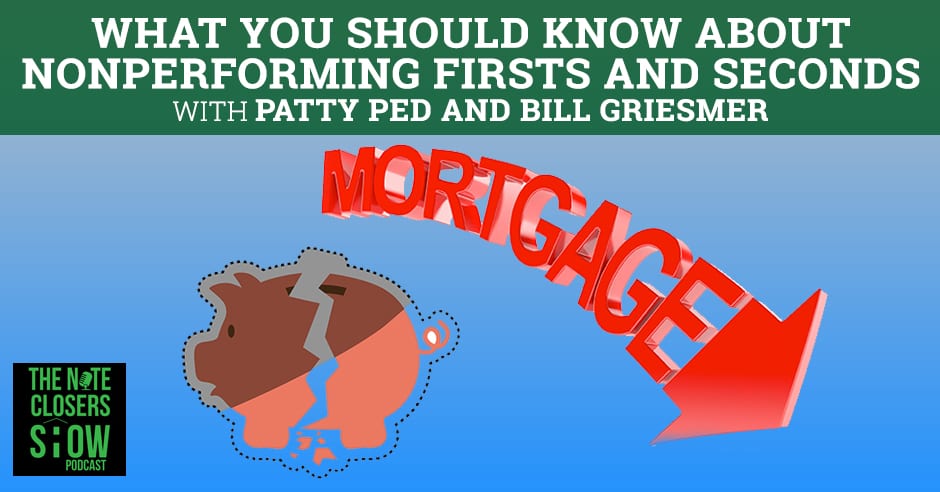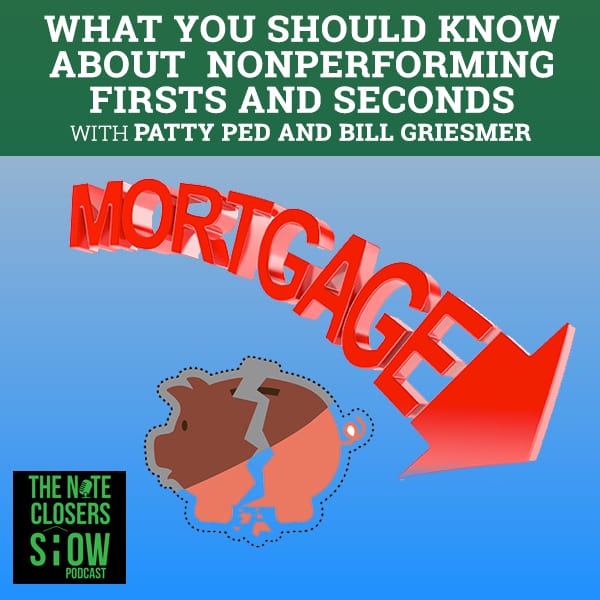
In the note business, the primary intent is to let the borrowers keep their home and happy about their choices. When you’re a nonperforming first note holder, you are first in line, you have a lot of flexibility going there, and you have a lot of options that you could provide the borrower to ensure that they can keep their home. Patty Ped of Aider Financials shares it’s more challenging to provide the help that they want to in a second mortgage rather than the first, and so the first is a better option for them. With nonperforming seconds, with the ROI being more, the risk is also more. Join Patty Ped and Bill Griesmer as they discuss the differences between the second space and the first space, the way you deal with things, your due diligence, your focus, the amount of time and work you would spend on the borrower and the note itself, the servicing, managing it, the entire thing.
—
Listen to the podcast here
What You Should Know About Nonperforming Firsts And Seconds with Patty Ped and Bill Griesmer
I’m with Patty Ped here from Aider Financials in Harrisburg, Pennsylvania. Hi, Patty.
Bill, how are you?
I am doing fantastic. I’m really excited to be talking here with everyone. Patty and I we’re working really hard and we thought we came up with some really good content for you. Patty and I were talking and we’ve met a couple times in person. We’ve talked before on social media. We’ve both learned a tremendous amount from Scott Carson. We also do things at least a little bit different. We both are focusing on nonperforming firsts right now. Patty, one thing that you might do a little bit different, it’s my understanding that not too long ago, you were investing in second mortgages and you’ve been changing your focus now to invest partially or at least mostly for the time being in first mortgages. You want to tell us a little bit about that and why you chose to do that.
Everyone who is joining us for the first time, I’m Patty Ped. I am with Aider Financials. We are a private mortgage investment forum based out of Central Pennsylvania. We do invest in notes nationwide. We do have some favorite States. As Bill mentioned, we started off investing in performing seconds. Once we got to hang of it, once we learned what the note business was about, we liked seeing those checks in our account every month, but we learned about nonperforming seconds. We learned about the ROI being more, which also means the risk is more so we wanted to venture into that and see how that would work out for us and it worked well. Then we started learning about first nonperforming mortgages and the differences between the two. The second space and the first space, they’re both entirely different. The way you deal with things, your due diligence, your focus, the amount of time and work you would spend on the borrower itself and the note itself, servicing the entire thing, managing it. They’re completely different in both of them.
For our personality, the first space was better suited. I think we ran into a couple of scenarios in our seconds where we wanted to help out the borrower, but because they were already I’m delinquent on their first and the first was getting ready to foreclose on them. We weren’t able to help the borrower as much as we liked to. We were trying to negotiate with the first on behalf of the borrower and we were trying to get them some great a deal going on. Luckily, we did do that this time but we realized that it was more challenging to provide the help that we want to in a second mortgage rather than an our first. When you’re a first mortgage note holder, you are first in line, you have a lot of flexibility going there and you have a lot of options that you could provide to the borrower and ensure that they can keep their home, which is our primary intent. We want the borrowers to keep their home. We want them to be happy about their choices. I think one of the main reasons we switched for us was it allowed us to do that in the first. For our personality, I felt like the first was a better option for us.
On my account one thing that I do, or at least I have done in the past a little bit different, I initially started off thinking I was going to buy and use performing notes and at the time similar to what Patty’s saying, I thought I did an inventory on my goals and situation and what I was trying to do. I thought performing notes was going to be the ticket, it’s going to be the bomb. It worked out okay. Some were better than others obviously if you’ve seen some of my other presentation, you’ve seen me talk about at least one of them that became a problem child. The thing that I came to conclude with performing notes it’s like buying a stock way up at the top of its value. Performing notes are expensive. If everything continues to go well and that borrower continues to pay, then you’re doing good. If something goes wrong, if that borrower loses a job, gets divorced, has health problems, has medical bills, whatever, and then they stopped paying you instantly overpaid for a nonperforming note.
The nonperforming note that takes longer to work out and it’s more expensive. If you came at that from a performing note level, that that becomes very problematic. It does happen sometimes that you can buy what’s considered a performing note and then it becomes nonperforming. They both have their place both performing and nonperforming notes. Based on my situation and my goals and circumstance and I see more opportunity at least with regards to nonperforming note. However, and this is a big but I’m a good deal, is a good deal. Whether it’s performing, whether it’s nonperforming a good deal, definitely is a good deal. You had mentioned that you had some other decisions that you were making and continue to make about your buying criteria in the states that you buy in. Why don’t you tell us about that, Patty?
It was tough initially because there are 50 states and we wanted to focus on say the top five instead of trying to be all over the place. We spoke to a lot of investors, senior investors who have been doing this for many years now and we try to find out why they chose the states that they did. The short answer is it’s entirely up to the investor. Just because I say that I invest in these states and these are good for me, it doesn’t mean it may be good for you. You have to come up with your own list of states. Some of the things that we went through when we started making this list is we made a decision matrix with all 50 states and then items such as, is it a judicial or non-judicial state? Do they do trustees or do they have hardest hit funds? Do they have super liens, HOA? How many months it takes to foreclose? It doesn’t mean that because it’s a longer duration, we don’t want to do it. We need to know what it is so we can factor in those costs into our ROI calculators and make sure we’re not over-calculating things or we’re not thinking that we’re going to get a 40% ROI on it. Then we realized it’s an eleventh month foreclosure timeframe and then you only end up with $10,000 or whatever. We need to know these things to make sure that we’re making informed decisions about these deals.

Nonperforming Firsts: Whether it’s performing, whether it’s nonperforming a good deal, definitely it is a good deal.
Similarly, about HOA liens, if it’s a state where the HOA could be a super lien. We need to make sure that we, when we do our due diligence, we call the HOA and we asked them if there are any liens on it and if they say, “Yes, it’s $200.” Then we add that into our ROI calculator and make sure we’re accounting for it. It doesn’t mean we’re not investing in that state. We want to be aware of what the equation is. Some states have redemption periods. Alabama has almost a one-year redemption period.
When it becomes an REO, when it goes to a foreclosure sale and when it becomes an REO, you literally have to actually make sure you’re not spending too much in that one-year period of time because the borrower could come back anytime. Pay you the unpaid principal balance and whatever pay off costs were and take the property back. If you have spent money on the grass cutting or making it look pretty or anything else, you’re losing all of that money when the borrower does that. When it’s a long redemption period, you want to make sure that you’re not putting too much money into it before you know what the situation is and until you’re sure what’s going to happen there.
I’ve heard some investors even go to the borrower and essentially buy out their redemption rights. You can generally buy those pretty cheap under some circumstances.
It one case, it worked out great. That was one of our decision coins to make sure we knew what we were getting into. Then talking about deficiency judgment, in some States, if the property’s under water and we usually invest in underwater properties, you could potentially get a deficiency judgment for the remaining amount. Let’s say the borrower owes you $100,000, but the property was only worth $50,000 or $60,000. You could get a deficiency judgment for the remaining $40,000, which you could still collect from the borrower though, not on the property itself. That’s something that we try to go over and look at for each state to see what the laws are in that state. We looked at the total cost to see what the attorney costs are, what the court cost are? One of the main things that I’ve seen, at least I struggled with initially was publication costs. For example, Oregon attorney costs and foreclosure costs are not so bad, but publication itself costs $4,000 and we learned that the hard way. That’s something that we’ve been making a good matrix or a table about what the costs are in each state, which will help us of course, calculate our ROI and see how much we need to put in before we see anything back.
She’s looking and she’s collecting data and then she’s trying to put it in an easy to use format so that she can use that then to continue to improve what she’s doing and continue to make better decisions going into the future. That’s an important note for anyone watching to try to learn and incorporate in whatever it is that they’re doing.
The thing I like about this model is that once I have it in an Excel format or in an editable format, Fannie Mae releases new guidelines for attorney costs and court costs every two years. Every time I get the court costs back or the attorney costs back, I go back and update my numbers in my sheet so that I don’t have to remember to go back to the source every time. It’s nice to have that flexibility with the data that I have here. Based on all of these decisions that I picked out a few states for us personally we have Ohio, Indiana, Florida, Michigan, Tennessee and Texas.
We’ve also added Missouri and South Carolina to the list. One of the most important aspects of this was our power team. We make sure in all of these states that we have good attorneys, our servicers do the servicing there and realtors are there to do the drive-bys and get us the numbers and make sure it’s in a good rental area and all that. I know we’ll go into a little bit of detail about this later. That’s one of the ways that we’ve reached that decision based on all of these factors and I’m power team. How about you, Bill?
I concur with quite a bit of what you said. My top three states are Ohio, Indiana and Michigan. Occasionally, I’ll get into Florida, Tennessee, and Missouri also. How I ended up going about this a lot of what Patty said, but breaking it down even a little more simply and practically. I live near Columbus, Ohio. Those first three states, I said Ohio, Indiana and Michigan, they’re all within one day of driving distance of me. If something went wrong, I could at any given day get up and drive there. The top part of Michigan and the Upper Peninsula.
That might be a little bit of a stretch, but even that I can get there and about thirteen to fourteen hours. In addition, I have a good attorney that’s licensed in all three of those states. That’s part of your power team, your super friends team that we’re going to talk about here. Those three states, they’re right in the heart of the Midwest. I definitely am a Midwest guy at heart and I like trying to help as best I can the area that I am from and that I liked the best. Then also, I have friends that live in all three of those states and you’ve got to be careful what you’re asking.
You’ve got to be careful what you’re asking your friends. I wouldn’t expect a friend because we’re buddies to go and drive eight hours or something. If it’s within a short distance from them, they might be able to stop by a house, do a drive by something like that, or go put something up on the door if need be or whatever the case may be. The laws aren’t too bad in those areas. Different states have different laws. That’s something to keep in mind for note investors. Each state is going to vary a little bit different. I definitely agree 100% with what Patty said, just because these are my states doesn’t mean they can or should be the states for everybody else.
My friend, Chris Seveney, he even said he likes to invest in states that some people shy away from. There’s less competition there. If you know how all those laws work, then it can still work out pretty well for you. My friend, Dave Putz, he lives in New Jersey and so he’s told me that he’ll sometimes buy in either New Jersey or New York, even though those particular states generally most note investors shy away from because they have longer periods of foreclosure and such. He lives there. He’s familiar with those states. That’s down in his wheelhouse.
Another thing I try to do is buy assets with a minimum fair market value. That’s the as is value right now of at least $40,000. That’s not to say I would 100% rule out anything lower than that, but my threshold to buy and my projected return better be even quite a bit higher than I’m normally looking for. Why $40,000? If you’re buying a house that has a $20,000 as is value, your projected return is 50%, $10,000 and your margin of safety there is roughly $10,000. It’s not that difficult especially on a more inexpensive house to blow through $10,000. If there’s structural damage or if it does end up needing a roof or something like that, you’re cutting deeply into your rate of return right off the bat versus if the house is a little more expensive. The cost of foreclose is the same on a more expensive house versus an inexpensive house. A lot of those costs are not that much more with a more expensive house, but you have a little bit greater margin of safety.
My minimum projected return on investment for me, I try to shoot for at least 25%, especially if I’m doing it on a JV partner. If it’s my cash and I liked the deal enough, I’ll sometimes go down to 20%. It’s the old saying, pigs get slaughtered. If you’re trying to take too much, you end up sometimes not doing so well. Then with a nonperforming full note and mortgage, I will try to avoid homes that have a lot of homeowner equity or borrower equity. Generally, under those circumstances, the homeowner probably knows that and there’s a much greater chance that they’re going to try to fight you tooth and nail and they can slow down the foreclosure process. That’s a little background between how I’m patty and I go about making decisions and the type of factors that we look at. Then Patty and I were talking about some more things about kind of building your team. You can’t do this business all alone as a note investor. It’s important for you to have a team to have vendors and it’s helpful to try to establish some type of a relationship ahead of time.

Nonperforming Firsts: It’s important for you to have a team to have vendors and it’s helpful to try to establish some type of a relationship ahead of time.
Think about it, who’s going to probably get quicker service, if you’re a vendor or say you’re selling insurance and you’ve got one guy that I’ve met him at a conference or he gave me a phone call. I know the name of this company. I’ve heard his name and then someone else or calls me completely out of the blue. Human nature being what it is, he’s going to try to help both of course, that’s how he makes his living, but I’d say he’s more likely to help the guy that he already has at least a little bit of a relationship with and especially if he’s already a current customer.
Going through these vendors, we’re going to talk a little bit about how we find them or how we try to decide on them. You can always do research online and trying to have yourself even a team, even a network of cohort like our WCN Crew, our We Close Notes Crew. That’s very helpful. You’re tapping into the whole collective knowledge base of a number of people. No one knows everything. A good mentor ought to be able to help you with this. One of the first and most important members of your team, Patty, I think would be finding and using a local realtor. What are your thoughts on that?
That is correct, because the role of the realtor starts off even before you actually purchased the note. The way we usually do it is one, we do our initial due diligence, we put in a bid and once the bid gets accepted, we reach out to our realtors in that specific area. If we don’t already have a realtor, we usually try to find them through either ActiveRain or Zillow, Trulia or Realtor.com or whatever is available. Once we have made contact with a realtor, we explained to them what we’re trying to do, what our business structure is and what we need from them. The way it has usually worked out is if and when the property or the asset becomes an REO, is when the realtor would be asked to be the selling agent and the listing agent for the property. In exchange for that, they’re usually doing the drive-bys for us and we’ve had pretty good success with this model. Recently, we had another Huntington one where we did a similar thing where the realtor was very happy to do the drive by for us.
She took a couple of pictures from all angles to give us a sense for what the property looks like and we’re not looking at a photo on Google that was from ten years ago. The realtor also gives us the estimated repairs, what the rentals are in the area of what the market is currently. This current market may not be the same by the time you actually get to selling the house, which maybe four months from now or almost a year from now. It’s going to vary of course, but you’ll get a sense for what’s going on and how that would affect your numbers. She’ll also tell us what the after repair values are like and if there are any major developments going on in the area. What she sees as the future of the property. The realtor my own to be able to tell us if they already have a real investor who’s actively looking for properties in that area.
Usually they do and these are realtors who are experienced in working with investors. They usually have a couple of investors who are ready to purchase a property in the area and who have certain criteria that may match what we are looking at. This certainly helps. Once we have that initial conversation with them, if we try out a couple of different realtors and once we know that they are a good fit for us, we add them to our list of realtors. Next time anything comes up in the area, they are our go to person for this. We don’t want to do this all over again. This adds back to what you mentioned before about forming relationships. If we have a good working relationship with somebody, we want to maintain that and that’s how both of us get business and get things done. What have your experiences have been, Bill?
I will say, you want to make sure you communicate with the realtor right up front and set expectations. I’ve had some realtors charged me for going out and doing a drive-by or a BPO and I’ve had others not. It all depends. The one thing I would recommend is try to tell them and say, “If I do end up getting this house, I will list it with you.” Let’s face it, that’s a lot more lucrative than charging someone $50 or $75 or $100 for a drive-by in a BPO. Then as a last resort you can look at using a national company. WeGoLook is an example of that. I personally have never used them. I’ve heard mixed reviews myself.
Time is very important and that’s a big determinant in who you end up using. If you talked to a realtor and said, “I can’t get out there until next week.” A week’s a long time, you’re probably better off letting your fingers do the walking and trying to find another realtor. If you’re striking out, that’s when you can consider that a national company. Title reports would be another member of your super team that is very important. ProTitle seems to be the market leader with this. tax title and blighted property, those are the three main areas that a lot of investors can get into trouble that can kill deals. In my opinion, the most important thing with a title company and looking at title reports, whether it’s a full-blown title report or an O&E which is a little bit of a stripped down version. They answer questions that type of thing. That’s my thoughts, Patty.
I agree, Bill. As initial investors, it’s not always out there what amount of information is available in O&E report. There are tons of it, but you need to know what to look for and what are the red flags in this particular asset. We’ve used ProTitle before. Alex is wonderful if you have any questions about it or if you feel like there’s a discrepancy or we don’t understand what’s going on, we give Alex a call and then he’s able to walk us through the report and he’s able to tell us why it shows up the way it does and what that means, which is the most important part for me. Having the data is not enough. It has to be meaningful information. Alex and ProTitle helps us with that part where they convert the data into useful information that we could utilize to make some of the decisions that we do.

Nonperforming Firsts: Having the data is not enough. It has to be meaningful information.
The next member of your super team would be sources. Stephen King wrote in his book On Writing, “Writers write.” Lots of people want to be a writer, but they don’t write. Adapt to that note investors buy. Having note sources that you can use to buy inventory that is really important. There are different places you can go to that. You can go to the online exchanges. Val Sotir at Watermark does a nice job.
There’s Paul Birkett at Automation and there are the granites and FCIs of the world. They’re great to have easy access. They are likely to be a little bit more expensive than some other sources also. You can go straight direct to banks that can be time-consuming. You probably heard Scott talk about the Banking Blitzkrieg. I personally called each and every bank in the state of Tennessee. I anticipated getting a lot more tapes. I’ve got a couple things here and there, but not a lot of full-blown tape that you could do something with.
There’s hedge funds. Hedge funds are probably in the middle there. They’re probably a little easier to buy from, but that can also take some time to set up relationships and that type of thing. Lastly, there are some investors I know my friend, Dave, in Arizona, he’s been doing direct mail and trying to send postcards and letters to homeowners that maybe recently sold a house with a seller financing and maybe they want to sell the note and that can certainly be done. That can be time-consuming to weigh through each and every homeowner there. Patty, do you have any thoughts or any insight on note sources and what has worked for you?
You mentioned banks. I was literally cold-calling banks almost five hours a day at one point of time. The important thing about banks is going back to your point about relationships, the first time you make a call, you’re not going to get a tape. You’re probably not even going to be talking to the right person. You’ll probably reached the front desk and I would say 80% of the time they wouldn’t even know what you’re talking about because they’ve never heard that before. They don’t even know that these loans could be sold to somebody. I think Scott provides a script for a talking to these banks also. Having that in front of me definitely helped initially now that I have it by heart, but initially having that script was very helpful in trying to use the right terms when I talk to them and ask them pertinent questions because they don’t want to waste time on trying to explain their condition to you. Technically you should already know that.
Going back to the, the cold-calling aspect of it, once you are able to make contact with a certain bank manager. It usually takes a few exchanges between you and them before you can actually see something from them. Scott’s magic number and marketing magic number is five. You need to make at least five contacts with them before you see anything back from them. When I say contacts, email, phone, Twitter, LinkedIn, however you’re connecting with them. They need to see your name and associate with you at least five times before they can trust you and you can have a meaningful connection. My advice to new investors is if you’ve made a couple of calls or even 100 calls to the banks, don’t be disheartened because that’s the beginning of the process. A lot of investors spend all this time calling banks and then one week goes by and they give up. That’s not how it works. You’ve got to keep going at it. You’ve got to keep connecting the same with the same people again and again.
You’re going to make sure that you’re putting your name out there and marketing yourself and your company very well so the banks understand that you’re not this newbie who’s chasing squirrels. You’re here to do business with them and you’re serious about this. In your emails or in your conversations with them, if you can mention some of the deals that you’ve done, some of the deals that you’ve closed recently or anything that can provide a background about your investment and prove to them how serious you are about this, it certainly helps the banks understand that you’re not trying to broker notes. You’re not trying to make a quick buck off of these and you’re a serious investor. One more thing to note is that you’re not going to get a tape of say 100 or 200 notes from banks. Especially if you’re looking at smaller banks, you’re going to see two or three or sometimes even one asset that they’re looking to sell.
Once you do go over the details, if you feel like that’s not up to or matching your criteria, you can always go back to the bank and say, “This is what we’re looking for, but I do have another investor who may be interested. Do you mind if I shared this with them?” You need to take the banks permission to do that because of course you’ve signed the nondisclosure agreement with them and you wouldn’t want to mass advertise whatever deal they have. That would be a big no, no. Make sure you get the banks permission before you go ahead and market their deal. Mass marketing is not good when it comes to banks. You need to have a preferred list of investors who you either talk to before again, at least five times. Who have you invested with before? Who you have a good personal relationship with. That certainly helps in trying to identify serious investors again. Make sure that you’re not wasting the banks time or you’re not wasting the investors sign here.
Another member of your team, someone to do review collateral file, either review and/or storage. This could be you, you personally being the investor. It all depends on you. If you’re an investor, it’s probably a good idea to have experienced eyes look at it. There are companies that you can use such as ORION or Richmond Monroe. You can also have an attorney do it. You can also many times pay a servicer to do it. I know Madison and Shante will do it for you. You want to make sure that before you close on that and fork over a lot of money that it is an enforceable lien and to make sure that collateral file is complete. Then likewise, when you look at storage, you can either look at who’s going to hold the actual file with the pieces of paper with the actual ink on the page.
That is very important. It’s not a complete deal changer if it gets lost, but it will cost you time and money in order to fix that. Ideally you want to make sure that those files are kept safe and secure. You can either keep it yourself or you can use a company to do it, or sometimes your servicer will do it. If you do hold it yourself, I do recommend that you use a fireproof safe. I sometimes joke that if my house were to burn down a lot of my possessions would be gone, but the notes I own, I’ve got them locked in a fireproof safe myself. That should be intact, that should be able to ride out a fire. That’s my thoughts on that, Patty.
The other thing I wanted to add to that was that when you board your files, and we have not used Richmond Monroe yet, but we have been using ORION. When we board our loans with ORION, they do a quick review of the contents of the collateral file. If it’s missing any assignments of mortgage or any l allonges. If they see that there’s only a copy of the mortgage or the note and they don’t see the originals in there, they catch all of this and they send you an email saying that, “These are the files that we have received. These are the files that are missing. Did you want us to go ahead and get these assignments recorded for you or did you want to do that yourself?” There are a lot of value addition to using a company like ORION.
If you’re a first time investor and you do not completely understand how the collateral process works, I would highly recommend using somebody like ORION because they would review your entire file. They’ll send you a summary email saying that this is what your collateral file contains. These are the missing documents. If you are interested, they are also available to record your assignments of mortgage and go back to your seller and a couple of layers before that, get all the allonges and everything else for you. That was a good value addition from them.
Moving right along, another super friend you’re going to need is insurance. Preferably you want to have an insurer that can insure homes nationwide and Speedy Gonzales would be ideal. Trying to find someone that you can work with quickly that’s going to make sure you get insurance on something, speed is of the essence. You’re at a risk if your property is not insured. Not too much to say about that, other than insurance is important for ensuring the value of your investment.
That’s one of the first things we do as soon as we purchased the note and we start boarding it up with the servicer. We reach out to the insurance company. We use a National Real Estate Insurance Group for most of our properties here and we ask them for forced-placed insurance. They have a questionnaire that you fill out that asks you what the property’s worth, where it’s located, the address of it. Other questions related to the property that will help them come up with the monthly insurance costs or a yearly insurance costs. These numbers are very helpful. Once you do a couple of them, you get a sense for how much it would cost and in some areas especially Florida, you need flood insurance and other types of insurance.
The best part about force-placed insurance, is that if you are able to make contact with the borrower and if they come back and say that they already have insurance on the property, then you can actually cancel these insurances from and save some money on that. When you talk to an insurance company, make sure that this exists. That there is an option to cancel and you need to ask them if there’s a penalty to cancel or you need to pay two months in advance or what the situation is before you go ahead and do that. That’s one of the important questions you need to remember.

Nonperforming Firsts: When you talk to an insurance company, make sure that there is an option to cancel and you need to ask them if there’s a penalty to cancel.
Making sure that you have a good contact and good relationship with a servicer. Then possibly a special servicer, depending on your loan. The servicer, you want to make sure they’re licensed if they have to be in the state that your asset is in. I’m not positive, but I think some states you don’t have to be licensed. I could be wrong on that, but in general you want to know that and then if that is needed, make sure the servicer is licensed in the state you’re working in. Then customer service is really important. No one servicer is perfect for every single situation. Different servicers actually have different strengths and fee schedules and costs.
The best thing you can do probably is try to set up a relationship with them, meeting them at conference. Trying to get an idea of what they’re all about, what they’re good at, where you think might not be a good fit. Then trying to make your best decision with that. Your special servicers, that’s the SEAL Team Six of servicers. They’re going to help you do your workouts for nonperforming notes a little more quickly, a lot of times than a regular servicer will. They’ll get the fast right party contact very quickly. There are players in the Law Offices of Daniel Singer, a lot of our group tends to be their go-to guys there. Your thoughts on servicers and special servicers, Patty?
When we talk about special servicers, I really love them. One of the main reasons is what you mentioned where if you’re using a regular servicer, there are certain CFPB rules that you need to follow up and make sure you’re waiting the 30-day period after you give them a notice of default and you need to wait for it to get boarded. That’s a one and a half month to two months’ time period where you between you buying the note and you’re actually doing something about it. Special services suddenly held during this time period where they act as a counselor to this. They’re not debt collectors, they’re not there to harass borrower. It’s in fact the opposite of that. Special servicers are there to counsel, to help them understand what their hardships have been. How they can actually figure out if they could reorganize some of the finances and all of that. They’re there to collect information about the borrower, bring it back to us, the lenders so we understand their situations better and were able to provide better options, more flexible options to them based on the information collected by them.
If you are trying to do a deed in lieu with them or if you’re trying to do cash for keys or anything else of that sort, the special servicer again is there to help you. They’re there talking to the borrower. They’re the front end of your business and they’re there to help you. One of the things that I do want to point out for special servicers is that when you look at the servicing comments before you purchased the note, you can most likely get a sense for if it’s going to be a performer, if it’s going to be a foreclosure or if it’s going to be what the borrower intent has been over the past few years. It may change anytime. You can’t base your decision completely on that. It certainly gives you a sense for where it’s going to go. If you see that there have been door knock attempts before and the borrower has never responded to any of them. Let’s say the borrower is rude and just slammed the door in their face. We’ve had cases like that.
The thing is we did send our special servicer back out there and the same thing repeated. We felt like with some experience working on some files now, we know that if it’s happened in the past, there is a chance that it’s going to happen now. There is a chance, I’m not saying it’s going to happen but it’s a most likely scenario or there may be times when the borrower is finally ready to talk and they’d actually need a specialist servicer there. I’m talking about the usual cases. In those scenarios, we go back and look at certain other factors before we decide to hire a special servicer for those loans.
One other thing and this will depend at least partly a little bit on where you’re buying, especially if you’re buying North of the Mason Dixon line, having a property preservation company and sometimes they’ll actually do some contracting or some home repair if need be. The key there is making sure our home is winterized. You don’t want the mutant iceman or the winter warlock taking up residence in your empty house after you foreclose on it, for example. Making sure you get someone in there to do the winterization is key.
A couple of other ones here then, investors and JV partners that can be its own topic and many minutes gets spent on that and I’m sure books get spent on that and that gets into marketing and sales and that type of thing. Put it as simply and basically as you can. One of the, if not the most important things is from the start setting up clear expectations and setting up clear communication. In the words of Steve Lloyd, “Always make sure you’re doing what you said you were going to do.” Especially in this world, that doesn’t always happen. If you can be one of those people that does what they say they’re going to do, that can set you apart. It sounds so simple, but it is true.
The most important thing about investors or joint venture partners is at least what we try to do is under-promise and over-deliver. That’s the first thing. We make sure we’re not bringing them into the hole with these big numbers and flashy signs and then when they come in, there’s nothing there. We make sure that doesn’t happen. We also try to be very transparent in our proceedings. We give them a Google file folder where we store all of our documents, the collateral, the receipts, everything gets stored in there. They’re looking at every single thing that we are looking at on the file. We’ve had both types of investors active and passive. The passive ones usually want to know, “Am I getting money this month or not, or how’s it going?” The active ones are a little more involved. They want to learn the business. Related to what we’re talking about, they want to learn why we made the decisions that we did and what we could have done differently or what the consequences are of taking different routes through the process.
They’re a little more actively involved through the process and they’re learning everything about the, not as much as they can. I completely agree to Steve Lloyd’s point where he says, “At the end of it, you have to make sure that that investor is happy.” The main goal of this whole process is to make your investors happy, your borrower happy. If you’re buying it from a bank or a seller, your seller should also be happy. They shouldn’t feel like it’s a rip off. One of the main important things that the investor looks for is reliability and security. Even if the deal’s going South or you see some problems with the deals, the investors want to know about it and they want you to be honest and reliable in what you’re doing. I completely agree with that point though.

Nonperforming Firsts: One of the main important things that the investor looks for is reliability and security.
The last thing is not necessarily the least of course is having a coach or a mentor. This will depend a little bit on the person, but I can tell you a very good coach is very valuable. Some of you might know I’m a physical therapist, but I also actually trained with a strength coach, a professional strength and fitness and conditioning coach. It’s been a good relationship for both of us. I do have to say that I’m stronger than I’ve ever been, partly because of him. He comes at things from a little bit different angle, but then he’s also listening to me and added some exercises before.
In terms of note investing both Patty and I are students of Scott Carson. We both think very highly of him. In addition to him being a top notch coach it’s partly the network and the team of students that he has. If someone doesn’t fit in, they don’t tend to hang around very long and that’s okay. Not everybody is going to be a fit for everybody. You have to find both the coach and then the team that’s going to be a good fit for you and that’s going to be a little bit different for everybody. The one thing I can think about having a winning mindset and a winning culture.
Urban Meyer and the Ohio State Buck, a couple of years ago, they won the National Title with their third string quarterback. I’m a Cleveland professional sports fan but they can learn a tremendous amount just about a winning culture and expectations and working hard and just expected good things to happen to you. OSU, their top two quarterbacks got hurt and then a third guy just stepped right in and the team just kept right on rolling. Everyone knew what they were expected to do. They had clear roles. They talked about it in this book, Above the Line, is the motto that they use, “The outcome is dependent upon the event and then your response to it.” That’s E+R=O that’s the big equation that they use for that. That’s my thoughts on that, Patty. Your thoughts about a coach or a mentor or a team of cohorts or anything like that?
That is one of the most important things in the note business, especially because this is a very close knit tight community of friends and investors. It’s certainly helps, especially if you’re a newbie. It certainly helps to have that note family or the network that can help you out. Not with how you do your business, but also finding vendors. They can provide recommendations as to who they’ve used before or what their experiences happened. Having an old family is very important. Going back to the mentor’s part, I don’t think we could have come this far without having good mentors and we’ve been very lucky in that aspect. When you started off in seconds, we had Fuquan Bilal and Matt Allan. Fuquan has amazing content on YouTube and on his website where he explains the note investing process and what we need to look at especially in the second area.
We’ve also attended several webinars and training sessions of Dave Van Horn. In fact, he was the very first person who have inspired us to get into the note business. PPR they’re a few hours from here. They’re from Pennsylvania as well. Dave was very instrumental actually to get into this field for us. We’ve done a lot of different trainings, a lot of different webinars and we’re still learning. We’re still doing all of that and in the first space, Scott has been amazing with his training programs, with his content. The Note Buying Blueprint was one of the very first ones we did. I love the content and the way it was structured. It was for an analytical person like me.
I need to have it in a very structured format for me to wrap my head around it and Scott certainly has that. He has a little bit of both, which is amazing. I think it caters to both the left and the right brain. Then we start off with the Note CAMP and we were there and Note CAMP also awesome because we’re not there listening to new people, new in the sense for that Note CAMP investors, but they’re actually senior investors are not investors. They’ve been attorneys and servicers and all of the power team that we mentioned. They’re all there talking about their respective services and why we need those services in our note business.
The good part is also the Base Camp group where you’re asking questions, where you’re posting your deal questions or any questions that you may have and you have this entire family of Note CAMPers who are there to help you out with that. Then we recently did the Fast Track and Chris did a recent podcast on this. Fast Track is also amazing because you’re actually sitting down one-on-one, with Scott Carson for three days in a row trying to pick his brains and get everything out of him. Trust me, three days are not enough to do that.
Mentors are very important and they don’t. I know Scott is a wealth of information and he’s always there. He’s readily available on his cell phone, text, email even at 2:00 in the morning, he is responding to texts and I’m like, “Is he awake?” It’s amazing how he always responds within a few minutes and he’s asking you further questions about the deal and he’s always helping you. It’s good to have that support especially for people who have analysis paralysis. Where I understand it’s a lot of data. I was in that situation and it’s scary to take that first step. Having a good mentor helps you through that initial transition period. Once you’re in the pool, you’re having fun.

Nonperforming Firsts: Having a good mentor helps you through that initial transition period. Once you’re in the pool, you’re having fun.
There are two notes I want to add here. If someone is interested, I do have a handout for the content that we went over. I would be happy to send that out to anybody that would like it. Drop me an email and I’ll make sure we get that out to you, that’s one thing. The other thing is that both Scott Carson and I will be present and speaking at a note conference being put on by the Cincinnati and Columbus REIA Associations that are headed up by Vena Jones-Cox. This conference will be held on August 11 and 12 near Cincinnati, Ohio at the town of West Chester, Ohio. Any last thoughts, Patty?
I think one of the most important things is having a good power team is definitely a great thing to do. It doesn’t have to be right away. You’re not going to have this awesome team to start with. It takes time to build these relationships. As you keep going to conferences, as you keep speaking to more investors, as you keep talking to more people, you’ll start slowly building these relationships and contacts for your network. If you don’t have any people in your network, feel free to reach out to our Note family. Everybody’s always here to help you. Some of the decisions are tough to make initially until you get a hang of it. You’ve got to take chances.
The only way you learn in this business is by doing it. If I tell you I’ve had success with a sudden thing, it doesn’t necessarily mean you’re going to follow my footsteps and have the same success. If you’re having thoughts about if you have to do it or not, if you have to do this or about any decision that you are struggling to make, feel free to reach out to either me or a Bill here. We’ve added our contact information in the comments and you can go in and contact us anytime at all. I’m Patty Ped with Aider Financials and this is Bill Griesmer with Stonegate Capital.
Thank you very much, Patty. Thank you very much and have a great day.
Thanks, Bill. Thanks everyone.
Important Links
- Aider Financials
- WCN Crew – Facebook Group
- ActiveRain
- Zillow
- Trulia
- Realtor.com
- WeGoLook
- ProTitle
- On Writing
- Watermark
- Automation
- Banking Blitzkrieg
- ORION
- Richmond Monroe
- Madison Management
- Speedy Gonzales
- National Real Estate Insurance Group
- Law Offices of Daniel Singer
- CFPB
- Above the Line
- Fuquan Bilal
- Matt Allan
- YouTube – Fuquan Bilal
- Dave Van Horn
- PPR
- Note CAMP
- Fast Track
- Vena Jones-Cox
- Stonegate Capital
About Bill Griesmer
 Bill Griesmer is the Managing Member of Stonegate Capital, which buys and sells performing and distressed notes. He may be reached at wjgriesmer@gmail.com.
Bill Griesmer is the Managing Member of Stonegate Capital, which buys and sells performing and distressed notes. He may be reached at wjgriesmer@gmail.com.
About Patty Ped
 An experienced mortgage investment firm based in Central Pennsylvania. We work with banks, property owners, and our investors to provide creative solutions to their problems and help create cash flow and good returns for our investors.
An experienced mortgage investment firm based in Central Pennsylvania. We work with banks, property owners, and our investors to provide creative solutions to their problems and help create cash flow and good returns for our investors.

